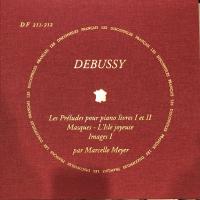Marcelle Meyer Plays Debussy Is French Record Company’s Superb AAA Debut
Meyer’s LPs that were released regularly sell for $1000+. Even the 78s fetch hundreds of dollars. You might say she’s got a Joanna Martzy-like following among record collectors who are aficionados of French impressionist composers.
The reasons for the interest in her recordings is easy to understand: she was born in Lille, France in 1897 and at age 14 entered the Conservatoire de Paris. When she was 16, she won a “Premier Prix” competition after which she studied Ravel’s music with Spanish composer/pianist Ricardo Viñes who was well-regarded as Ravel interpreter as well as other French composers, including Debussy and Satie.
At age 20 Meyer played the premier performance of Satie’s “Parade”. She met at the premier Claude Debussy and coached him on how to play his “Preludes” and was the first to play them in recital. She went on to become Erik Satie’s favorite pianist and premiered with composer Francis Poulenc his piano Sonata for four hands. In April of 1920 Ravel invited her to play with him a two-piano version of La Valse in private recital with an audience of Stravinsky, Diaghilev and Poulenc.
The “pianist’s pianist” went on to play public recitals throughout Europe. Meyer died of a heart attack November, 17th 1958 while playing her sister’s piano. She’d been planning at the time her first North American concert appearances.
Meyer began her recording career and association with Les Discophiles Francais in the late 1940’s with recording engineer/audio pioneer André Charlin. Charlin held patents for a push-pull electrostatic loudspeaker and for a variable reluctance phono cartridge. He got involved in “the talkies” and in 1934 produced a stereo sound track for Abel Gance’s 1927 silent movie “Napoléon”. Our kind of guy!
He sold all of his many electronics patents to Philips after World War II and returned to recording music—something he’d abandoned years earlier. In 1949 he produced the first European microgroove vinyl record. In 1958 he developed a stereo recording technique and in 1963–64 he patented the Tete Charlin, a dummy head for commercial stereophonic records using two high-quality Schoeps microphones. He also co-founded Erato Records. Charlin died November of 1983 at age 80. Most of Meyer’s recordings were for Les Discophiles Francais.
Perhaps Meyer’s passing so close to the scheduled release date is what prevented the original release of this record. Whatever the reason or reasons, this double LP set produced from the original Les Discophiles Francais tapes is the first time these recordings have been released commercially. If you want to learn more about Meyer, visit the Bach Cantatas website.
While Meyers’ background makes clear her talents, you needn’t be a Debussy fanatic to immediately be drawn into her fluid, dazzling playing of the 24 Preludes, divided into 2 books and recorded in 1956 and 1957. The program also includes other solo piano pieces.
The monophonic sound is reminiscent of the Martzy violin recordings of this period: somewhat distant as if you are listening from the far end of a long room, but with great clarity and especially of the transients and upper register, though it all sounds quite fine and it never becomes “boomy” or bloated. The image of the piano is stable and well-defined within the space. I can’t imagine any digital version of this recording having the natural textural expressiveness produced by these all-analog records. Never, not once did I hear overload distortion, despite the dynamic peaks produced by Meyer’s intense playing.
The reissue production is interesting and international in scope: the tapes were brought to America (Nanuet, NY to be specific) where Trutone Mastering Labs’ Carl Rowatti cut lacquers. The lacquers were then taken to Salina, KS, where QRP’s Gary Salstrom did the plating. The metal parts were then flown to Germany and pressed at Pallas.
The packaging is “Electric Recording Company” exquisite: gatefold with the outer jacket done in “heavy canvas” and deeply embossed gold leaf lettering like the original DF’s and an inner gatefold of pasted heavy paper stock. (Note: the 9 for sound takes into account the age of the recording).
The pressing quality (at least of the sample I was sent) is perfect: the records are 100% concentric and I did not encounter a single pop or click. Of equal importance is the absolute black background silence. The double LP set is costly at 600 Euro, but it’s otherwise unavailable and for those who can afford it, it will bring repeated pleasure well in excess of the cost—it’s the proverbial magical musical time machine.
Speaking of ERC, it recently reissued a Les Discophiles Francais recording (DF 209-210), Bach’s Sonatas for violin and piano but played on the organ by Marie-Claire Alain with Michéle Auclair on violin. In this case, as with all ERC reissues, it was cut on an all-tube cutting system using a mono cutter head. Originals of this regularly sell for $5000+ and sometimes in excess of $6000!
By the time the review sample arrived, it was sold out on the ERC website. However, another DF release is scheduled for January 31st, 2020 release and is still available though it too, like the Bach release is limited to 99 copies. On this one Auclair partners with pianist Jacqueline Bonneau in a program of Ravel and Debussy.



